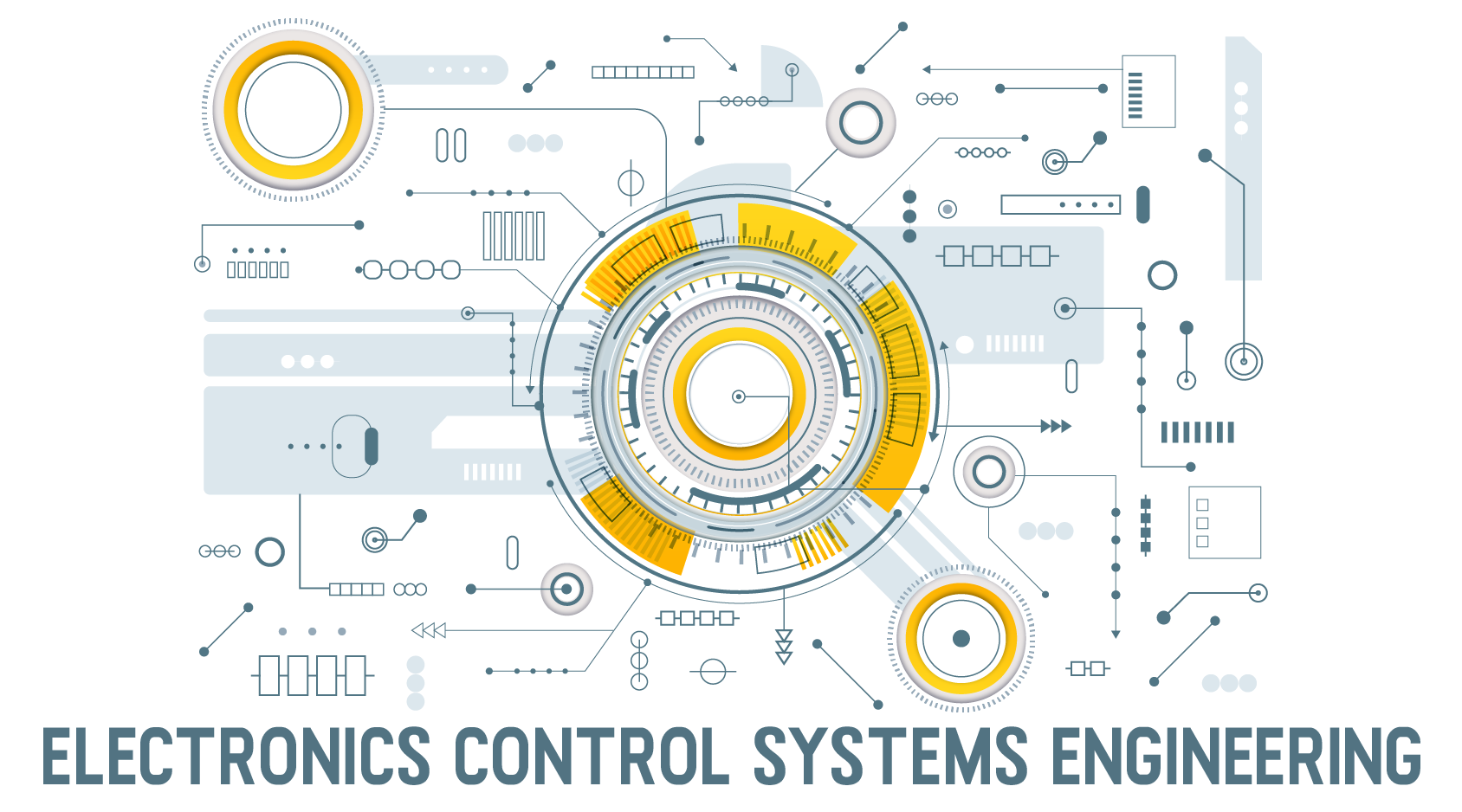Electronics Control Systems Engineering is the branch of engineering that focuses on the study of the effects of electrons to build new components, systems, devices, equipment, etc. Electronics Control Systems Engineers also design, analyze, and manufacture electronic devices, wireless devices, integrated circuits, digital & analogue working of electronic circuits. Candidates need to have a good understanding of electronic components with imaginative and technical skills. The scope in this field keeps on increasing as the usage of digital technology is expanding.

What you will focus on?
- Electrical Circuits & Systems
- Electromagnetic Fields
- Electronic Devices & Components
- Signals & Systems, Numerical Methods
- Network Analysis
- Analogue Circuits & Systems
- Digital Communication Systems
- Microwave Engineering
- Microprocessor Engineering
Highlights:
| Course Name | Electronics Control Systems Engineering |
|---|---|
| Course Level | Diploma, B. Tech (Bachelor of Technology), and M.Tech (Master of Technology) |
| Duration |
Diploma: 2 -3 years B.Tech: 4 years M.Tech: 2 years |
| Examination Type | Semester Type |
| Eligibility |
Diploma: Must have completed 10th with a minimum of 50% mark in aggregate B.Tech: Must have completed 10+2 with a minimum of 50% mark in aggregate M.Tech: B.Tech or Equivalent degree in Engineering |
| Top Recruiters | BHEL, ISRO, Havells India Ltd, Siemens, Wipro, Amazon |
| Top Career/Job Profiles | Electronics Engineer, Automation Engineer, Electronics Production Engineer, Electronics Design Engineer, etc. |
Top Colleges
- Kalinga Institute Of Industrial Technology (KIIT), Bhubaneswar
- Bharat University, Chennai
- Graphic Era University, Dehradun
- Sree Vidyaniketan Engineering College, Andhra Pradesh
- National Institute Of Electronics & Information Technology, New Delhi
- Jawaharlal Nehru Technological University, Hyderabad
- Satyabhama University, Chennai
- College Of Engineering, Pune
Eligibility Criteria:
Candidates need to check their eligibility criteria before applying for any degree in Electronics Control Systems Engineering. Candidates should complete their 10 +2 with a minimum mark of 50% in aggregate. Check the full eligibility in the table below:
| Course | Duration | Eligibility | Entrance |
|---|---|---|---|
| B. Tech in Electronics Control Systems Engineering | 4 years |
|
JEE Main, WBJEE, KIITEEE |
| M.Tech in Electronics Control Systems Engineering | 2 years |
|
GATE, TANCET |
Syllabus:
For B.Tech in Electronics Control Systems Engineering:
| Semester I | Semester II |
|---|---|
| Physics I | Physics II |
| Engineering Graphics | Chemistry |
| Mathematics I | Mathematics II |
| Computer Science | Electrical Engineering |
| Communication Workshop | Environmental Studies |
| Physics Lab I | Electrical Lab |
| Engineering Graphics Lab | Chemistry Lab |
| Computer Lab | Physics Lab II |
| Engineering Workshop |
| Semester III | Semester IV |
|---|---|
| Mathematics III | Electromagnetic Theory |
| OOPs with C & C++ | Instrumentation & Measurement |
| Signals & Systems | Digital Logic Design & Application |
| Electronic Devices & Circuits (EDC) | Analog Electronics |
| Network Theory | Information Theory & Coding |
| OOPs Lab | Instrumentation & Measure Lab |
| EDC Lab | Digital Circuit Design Lab |
| Electronics Lab | Analog Electronics Lab |
| Semester V | Semester VI |
|---|---|
| Linear Integrated Circuits | Antenna & Wave Propagation |
| Numerical Methods & Applications | Control System Engineering |
| Microprocessor and Peripherals | Digital Signal Processing |
| Communication Theory | Digital Communication |
| Power Electronics & Derives | Advanced Microprocessor and Embedded Systems |
| Microprocessor Lab | Advanced Microprocessor and Embedded Lab |
| Linear Integrated Circuit Lab | Communication Lab |
| Semester VII | Semester VIII |
|---|---|
| VLSI Engineering | Micro Electro Mechanical Systems |
| Nano Electronics Technology | Industrial Automation |
| Microwave Electronics | Industrial Organizations and Management |
| VLSI Lab | Major Project II |
| Microwave & Antenna Lab | |
| Industrial Training | |
| Major project I | |
| Electives | Electives |
| Optical Communication | Radar Systems |
| Remote Sensing | Multimedia Systems |
| Wireless Communication | Biomedical Instrumentation |
| Solar-cell Technology | Broadband Communication |
| IC Technology | Mobile & Cellular Communication |
For M.Tech in Electronics Control Systems Engineering:
| Semester I | Semester II |
|---|---|
| Advanced Mathematics | Computer Control of Processes |
| Advanced control system | Logic & Distributed Control Systems |
| Advanced Industrial Instrumentation | Analogue & Digital Circuit Analysis & Design |
| Neural, Fuzzy, and Genetic Algorithm | Elective I |
| Software for control system design | Elective II |
| Instrumentation and Process Control Lab | Analogue & Digital Circuit Design Lab |
| Semester III | Semester IV |
|---|---|
| VLSI Circuit Design | Project Work & Viva Voce |
| Embedded systems Design | |
| Advanced Digital Signal and Image Processing | |
| Elective III | |
| Elective IV | |
| VLSI, Embedded and Test Engineering Lab |
| Electives | |
|---|---|
| Advanced Instrumentation System | PC Based Instrumentation |
| Advanced Process control | Process Modelling and Simulation |
| Advanced Digital Control System | Adaptive Control Systems |
| Advanced Digital Communication | High-Performance Communication Networks |
| System Identification | Micro-Controller Based System Design |
| Opto Electronics & Lasers | Fault-Tolerant Control |
| Virtual Instrumentation and its applications | Optimal Control & Filtering |
| Advanced Robotics & Automation | Industrial Data Communication & Control |
Admission Process:
For B.Tech in Electronics Control Systems Engineering:
- Candidates should clear the eligibility criteria
- Most of the colleges offer admission based on scores of entrance exams such as JEE Main, WBJEE, KIITEEE.
- Some colleges provide admission directly based on the marks secured in the 10th and 12th.
For M.Tech in Electronics Control Systems Engineering:
- The candidate should be eligible for the degree
- Institutions provide admission through valid scores of GATE, TANCET, and other such entrance exams
- Some colleges also offer admission on the basis of marks secured in the undergraduate degree (B.Tech)
Skills Required:
- Creativity and Inventive
- Interest in Physics and Mathematics
- Good analytical skills
- Good communication and interpersonal skills
- Attention to detail and a team player
- Should have critical and logic thinking
Top Entrances:
1. JEE Main (Joint Entrance Examination)
- Minimum Qualification: Candidates must have passed 10 and +2 with Physics and Mathematics as compulsory subjects along with Chemistry/Biotechnology/Biology/Technical Vocation subjects
- Exam Duration: 3 Hours
- Exam Mode: Online
- Minimum Qualification: Candidates qualifying the JEE Main are eligible
- Exam Duration: 3 Hours
- Exam Mode: Online
3. WBJEE (West Bengal Joint Entrance Examination)
- Minimum Qualification: Candidates must have passed 10 and +2 with Physics and Mathematics as compulsory subjects along with Chemistry/Biotechnology/Biology/Computer Science /Computer Application
- Exam Duration: 4 Hours
- Exam Mode: Offline
4. KIITEE (Kalinga Institute of Industrial Technology Entrance Examination)
- Minimum Qualification: Candidates must have passed 10 and +2 with Physics, chemistry, and Mathematics as compulsory subjects with a minimum of 60% mark in aggregate
- Exam Duration: 3 Hours
- Exam Mode: Online
5. GATE (Graduate Aptitude Test in Engineering)
- Minimum Qualification: Candidates should have a Bachelor degree (4 years after 10+2) in Engineering/Technology
- Exam Duration: 3 Hours
- Exam Mode: Online
6. TANCET (Tamil Nadu Common Entrance Test)
- Minimum Qualification: Candidates should have a Bachelor’s degree or its equivalent with at least a 50% mark in aggregate
- Exam Duration: 2 Hours
- Exam Mode: Offline
Career and Job prospects:
After completing your degree in Electronics Control Systems Engineering, one can get job opportunities at various Telecommunication companies, Automotive companies, Railways, etc. Different types of job roles for this course are mentioned in the table below:
| Job Profile | Average Salary Per Annum |
|---|---|
| Electronics Control Systems Engineer | 4 - 8 Lakh Rupees |
| Instrumentation and Control Technician | 2 - 4 Lakh Rupees |
| Automation Engineer | 4 - 7 Lakh Rupees |
| Testing and Quality Maintenance Engineer | 5 - 6 Lakh Rupees |
| Network Specialist | 5 - 11 Lakh Rupees |
| Network Planning Engineer | 3 - 5 Lakh Rupees |
| Field Test Engineer | 4 - 6 Lakh Rupees |
| Research & Development Software Engineer | 4 - 6 Lakh Rupees |
Employment Areas:
- Automotive Companies
- Telecommunication companies
- Utility Companies
- Railways
- Manufacturing Companies
- Pharmaceutical Companies
- Oil and Gas Industry
- Research and Development
- Multinational Corporation (MNC)
Top Recruiters:
- Bajaj Electricals Ltd
- Bharat Heavy Electrical Ltd (BHEL)
- Indian Space Research Organization (ISRO)
- Wipro Lighting Corporate
- Havells India Limited
- Schnider Electric
- Crompton Greaves
- HBM power system
- Eveready Industries India Ltd
- Honeywell
- Siemens
- Deloitte
- Amazon
- Tata Power
Top Hiring Cities in India:
- Bengaluru
- Mumbai
- New Delhi
- Hyderabad
- Pune
- Chennai
- Jamshedpur
- Mysore
- Lucknow
FAQs
Q: What do an Electronics Control Systems Engineer do?
A: Electronics Control Systems Engineers design, analyze, and manufacture electronic devices, wireless devices, integrated circuits, digital & analog working of electronic circuits.
Q: What is the average salary of an Electronics Control Systems Engineer?
A: The average salary of an Electronics Control Systems Engineer is 4 - 8 lakh rupees per annum
Q: What is the software career after pursuing Electronics Control Systems Engineering?
A: A candidate can become a software engineer in top MNCs such as:
- Siemens
- Deloitte
- Amazon
- Accenture
- TCS
- Capgemini











